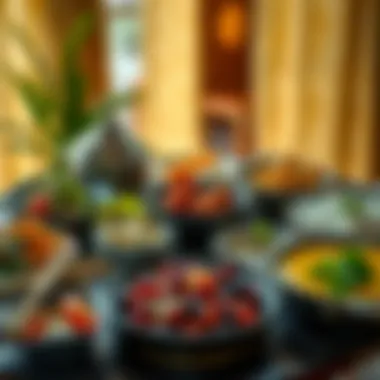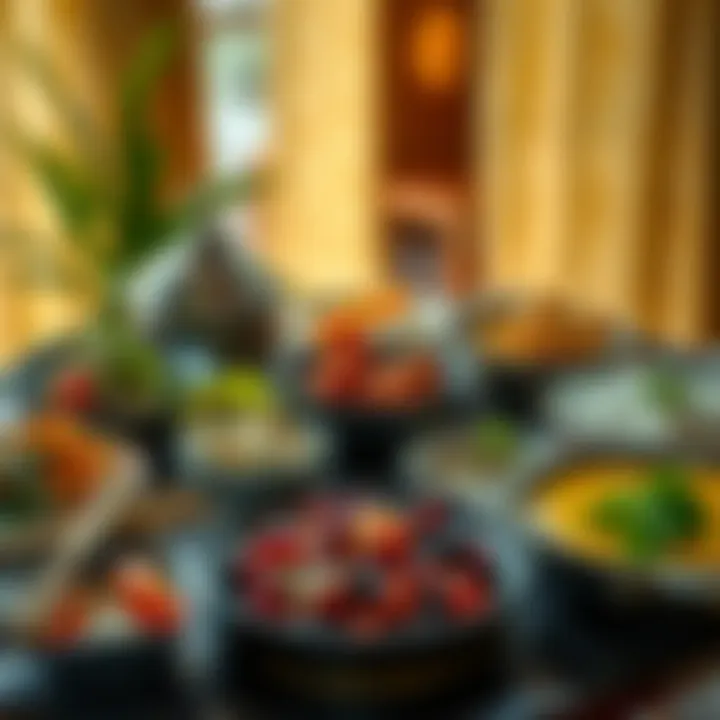The Significance and Timing of Suhoor in 2024


Intro
Suhoor, the pre-dawn meal observed by Muslims during Ramadan, is more than just a necessity for sustenance; it is a moment of reflection, preparation, and community. As Ramadan approaches in 2024, the significance of Suhoor extends further than simply filling one's stomach before the fast begins. It represents a connection to tradition and a commitment to spiritual discipline. This year, the timing of Suhoor varies considerably based on geography and local customs, with implications that go beyond just the clock.
Understanding the timing of Suhoor is not just about knowing when to eat, but about recognizing the essential aspects that shape this vital meal. Every region has its peculiarities—different communities may observe the meal at slightly varying times, influenced by sunset and sunrise hours. The cultural relevance becomes especially pronounced in a diverse world where every corner brings unique flavors and practices to the table.
Thus, this piece will delve deep into the cultural, religious, and practical dimensions of Suhoor up to 2024. We aim to provide clarity not just on the exact timing but also the rituals and their meaning. By the end of this exploration, readers will walk away equipped with knowledge that enriches their Ramadan experience and appreciates the importance behind this sacred meal.
The Essence of Suhoor
The pre-dawn meal of Suhoor stands as a cornerstone in the observance of Ramadan. It not only sustains individuals physically during the rigors of fasting but also fulfills a profound spiritual role. By grasping the essence of Suhoor, one can appreciate its multifaceted significance in the lives of Muslims around the world.
Definition and Role in Ramadan
Suhoor is more than just a meal; it is the last opportunity to eat before the fast begins at Fajr, or dawn. This meal varies widely in terms of cultural offerings, ranging from simple foods like bread and dates to elaborate spreads that could rival a feast. It can be seen as a merciful moment that prepares not only the body but also the mind for the day's fast ahead.
The meal typically occurs in the early hours, just before dawn, and holds a special place within the daily practices of Ramadan. Observing Suhoor allows one to indulge in the nourishment needed to sustain energy throughout the day. Furthermore, it provides a chance for reflection, prayer, and companionship, particularly when shared with family and friends. By nurturing both body and spirit, Suhoor paves the way for a more fulfilling Ramadan experience.
Historical Context
The practice of Suhoor has deep historical roots within Islamic tradition. The term itself derives from the Arabic word "sahur," which means "to eat in the early morning." This meal is not merely a modern innovation but has been a component of fasting since the time of the Prophet Muhammad. It is documented that he encouraged taking Suhoor, stating its blessings and importance.
In various regions, the historical practices surrounding Suhoor have evolved but have always maintained a focus on community and spirituality. For many, it reflects the collective values of patience, reflection, and charity.
Over the centuries, different cultures have adapted Suhoor traditions, adding to the meal's significance. For instance, in some regions, it is customary to gather in mosques to partake in Suhoor together, thus promoting a sense of community. Each cultural twist adds flavor not only to the food but also to the very act of sharing the pre-dawn meal. Ultimately, understanding this context enriches the perception of why Suhoor is cherished in the Islamic faith today.
"Suhoor is not just a meal; it’s the dawn of resilience, a nurturing ritual that energizes both body and soul for the day of fasting ahead."
As we delve deeper into the specifics of Suhoor in 2024, it becomes clear that this meal encapsulates not only the physical preparation for fasting but also the spiritual significance woven within the tapestry of Ramadan.
Suhoor Timing in
Understanding the timing of Suhoor is crucial for those observing Ramadan. It supports the proper observance of the fast, ensuring that individuals begin their day nourished and prepared. As the dawn approaches, not only does the time for Suhoor serve as a reminder of spiritual commitments, but it also requires planning and awareness of local practices, making it insightful for both new and seasoned practitioners.
Understanding Fajr Prayer
The Fajr prayer marks the beginning of the daily fast during Ramadan. It is performed during the early hours before dawn, and this pivotal moment signals that Suhoor must come to an end. The exact timing can vary by season and geography. In 2024, this means understanding when the sun is approximately 12 degrees below the horizon—a key indicator used in Islamic jurisprudence.
Fajr prayer not only serves as a spiritual awakening but also marks a literal and metaphorical break from food. Observers often incorporate prayers just before the dawn, deepening their reflection and connection with faith. Timing becomes essential because missing this window, even by a few minutes, can alter one's fasting experience dramatically.
Local Variations in Timing
In 2024, the timing of Suhoor across various regions can differ greatly. In large cities like Cairo or Istanbul, urban structures can cast shadows that affect visibility, altering perceptions of dawn. In contrast, rural areas might have clearer skies, simplifying the determination of Suhoor times.
- North vs. South: Those closer to the poles, especially during summer months, can experience substantial differences in daylight hours, impacting when Suhoor should end.
- Time Zone Differences: Global cities like New York and Dubai may have their own calculations based on local laws and customs.
For instance:
- In Mecca, Fajr prayer might be observed around 5:15 AM, while in London it could be as late as 5:45 AM, each time creating different cutoff windows for Suhoor.
Factors Influencing Suhoor Timing
The determination of when to end Suhoor can hinge on several factors. Here are a few important ones:


- Geographical Location: As noted, latitude and longitude impact dawn times. Living closer to the equator means more consistent day lengths year-round.
- Astronomical Calculations: Many communities follow detailed astronomical tables, while others may depend on local mosques to announce dawn.
- Cultural Practices: Local customs and traditions might influence how people interpret Fajr, some communities being more strict, and others somewhat relaxed in their adherence to the time.
- Technological Advances: Mobile apps now offer precise timing according to users’ locations, providing reminders that can aid in daily preparation.
Keeping abreast of these factors ensures that those observing can engage in this monumental period of fasting with both clarity and commitment.
Regional Time Considerations
Understanding the timing of Suhoor involves more than just a quick glance at the clock. It intricately ties into regional time considerations, which are essential for those observing the fast during Ramadan. Different locations can profoundly impact when Suhoor is consumed, and getting this timing right is pivotal for maintaining the spiritual observance of the fast. Notably, the local time zone, geographical position, and even cultural practices play a significant role.
Therefore, comprehending regional time considerations can enhance the Suhoor experience. For instance, those who live in areas with significant latitude changes might see a greater variance in daylight hours throughout the year compared to those nearer the equator. This variance affects prayer times, including Fajr, which consequently alters when Suhoor should ideally be eaten.
Dubai Time Zone Adjustments
In 2024, Dubai operates on Gulf Standard Time, which is UTC+4. This particular time zone can noticeably shift throughout months, especially during Ramadan when Fajr prayers mark the end of Suhoor. Residents of Dubai are likely to experience consistent timing; however, adjustments may occur due to daylight saving measures or local observances that can slightly tweak schedules.
A crucial aspect for Dubai residents during Ramadan is aligning the Suhoor routine with the sunrise timings that fluctuate daily. For example, on some days, Fajr may be observed as early as 4:30 AM, and on others, it may be closer to 5:00 AM. Thus, having a local Islamic calendar handy or utilizing apps that provide precise prayer times, like IslamicFinder or Muslim Pro, becomes imperative for timing those pre-dawn meals correctly.
“Time is of the essence in fasting during Ramadan, and knowing local timings can help maintain one’s focus.”
Comparative Timing in Other Cities
Looking beyond Dubai, the variation in Suhoor timing across different cities cannot be overemphasized. Cities like Cairo, Riyadh, or Jakarta, each has unique timing adjusted according to their latitudes and longitudes.
- In Cairo, for instance, Suhoor might be earlier than in Dubai since Fajr is often observed around 4:00 AM, especially as Ramadan progresses towards longer summer days.
- Meanwhile, in Riyadh, timings similarly adjust, reflecting their geographical positioning and altering daily. Fajr might be slightly later, around 5:00 AM depending on lunar sightings.
- In Jakarta, the meals are timed in respect to their own prayer schedule, often differing from the Middle East.
These variations underscore the need for travelers, expatriates, and even residents to remain well-informed. That’s where online resources or smartphone applications come in handy, providing up-to-date timings that can accommodate those differences. Knowing how the clock strikes in different parts of the world becomes crucial not only for Suhoor but encompasses the broader spectrum of Ramadan observance, ensuring a spiritually compliant and meaningful fasting experience.
Health Considerations for Suhoor
The importance of Health Considerations for Suhoor cannot be overstated. This pre-dawn meal lays the foundation for the entire day of fasting. It’s the fuel that keeps energy levels stable and helps to maintain focus throughout the rigorous demands of Ramadan. Not only is Suhoor vital for physical sustenance, but it also plays an integral role in mental wellbeing. A thoughtful approach to what you eat can make a world of difference in how one navigates the fasting day ahead.
Nutritional Importance
The nutritional value of Suhoor directly impacts one’s overall health during Ramadan. This meal should ideally balance carbohydrates, proteins, and fats to sustain energy. Complex carbohydrates found in whole grains, such as oats and brown rice, release energy slowly and provide a lasting fuel source.
Including protein-rich foods like eggs, yogurt, or legumes is equally essential. These foods assist in muscle repair and keep you feeling fuller for longer. Additionally, healthy fats from sources like nuts and avocados help absorb essential vitamins and provide energy.
By integrating these components, individuals can not only stave off hunger but also promote better concentration and mood stability. Think about it: a well-rounded Suhoor can help in avoiding the midday slump that often hits those who fast.
Recommended Food Choices
When planning your Suhoor menu, consider the following:
- Whole grains: Foods like oats, whole-wheat bread, or quinoa provide necessary energy.
- Protein sources: Eggs, Greek yogurt, or cottage cheese are excellent choices that satisfy hunger.
- Fruits and vegetables: Include hydration-rich options such as cucumbers, watermelon, or dates, which are also packed with natural sugars.
- Nuts and seeds: Almonds, walnuts, and chia seeds contribute both energy and healthy fats.
There’s no one-size-fits-all, so adjusting to personal preferences is essential. Mixing these food items can also keep the routine interesting and varied, ensuring you don’t feel stuck in a monotonous meal plan.
Hydration Practices
While eating is crucial, hydration holds equal importance during Suhoor. Dehydration can quickly become an issue, especially in warmer climates or during the longer fasting hours. Here are some practices to ensure optimal hydration:
- Drink Water Gradually: Instead of chugging a large amount at once, sip water steadily through the meal. This method is more effective for absorption.
- Avoid Caffeine: Limit or eliminate caffeinated drinks such as coffee or tea, as they can lead to increased urination and subsequent dehydration.
- Incorporate Hydrating Foods: Foods with high water content like cucumbers and melons can aid hydration.
Remember, a well-hydrated body contributes to better energy levels and cognitive function. Ultimately, these health considerations not only enhance the personal experience of fasting but also tie closely back to its significance as a spiritually enriching practice.


"The nourishment of your body is just as vital as the nourishment of your spirit during Ramadan."
Engaging in mindful eating and considering health aspects during Suhoor empowers individuals to maximize their fasting experience. Beyond simple sustenance, it becomes a comprehensive approach to personal well-being.
Cultural Significance of Suhoor
The role of Suhoor extends far beyond mere nourishment. It's a rich tapestry of cultural practices and spiritual reflections woven into the fabric of Ramadan. As families gather before the sunrise, this meal becomes a pivotal moment steeped in tradition, bridging generations and communities.
Suhoor in Different Cultures
Across the Islamic world, the approach to Suhoor reveals distinct cultural nuances. In Turkey, for example, the meal features a spread of olives, cheese, and freshly baked bread, embracing the bounty of the local harvest. It's a time to savor flavors that often escape the palate during the bustling hours of the day. In contrast, in Egypt, a warm dish of foul medames, a fava bean stew, often graces the table. Here, the meal reflects not just sustenance but also the communal spirit—friends and families gather, sharing not just food but stories, laughter, and hopes for the month to come.
In Southeast Asia, the diverse tapestry of cultures shines through in Suhoor preparations. In Indonesia, for instance, you may find spicy nasi goreng, or fried rice, bringing comfort and familiarity to those partaking in the fast. Each region puts its unique spin on Suhoor, making it a culinary celebration alongside the religious significance.
Moreover, these rituals can vary dramatically even within a single country, women in Pakistan might prepare traditional lassi while men might opt for heavier dishes—a reflection of personal and societal roles in culinary traditions.
Communal Aspects of Suhoor
At its core, Suhoor is a communal event, reminiscent of a family reunion at dawn. The gathering brings people together, allowing them to share in their spiritual journeys. This shared meal fosters a strong sense of belonging, uniting different generations and backgrounds, reminding everyone of their common purpose during Ramadan.
"The joy of Suhoor is not just in what you eat, but in who you share it with."
Gatherings often expand beyond the family unit. Friends and neighbors may be invited, creating opportunities for deeper connections and community bonding. It's common in many cultures to experience a form of open hospitality during this time, where sharing your Suhoor meal is seen as a blessing.
From elaborate feasts to simple, home-cooked dishes, the act of coming together enhances the experience of fasting. Families express love and care through carefully prepared meals, which can unknowingly radiate blessings as is common in the culture. It’s a chance to hear stories of ancestors who once observed the fast and to reflect on personal growth achieved in previous Ramadans.
Combine this with the spiritual reflections, and it’s clear that Suhoor is much more than a meal—it's a rich cultural ritual that underscores the importance of community, connection, and shared beliefs.
Practical Tips for Suhoor Preparation
Preparing for Suhoor is not just about filling your plate before dawn. It’s about laying a foundation for the day ahead, especially during Ramadan when fasting becomes a significant part of daily life. A well-planned Suhoor can significantly affect one’s energy levels and overall wellbeing, turning a simple meal into a vital part of spiritual and physical endurance. Here’s a look at practical strategies that can enhance your Suhoor experience.
Meal Planning Strategies
When it comes to Suhoor, having clear meal planning strategies is essential. This involves considering both the nutritional value and the ease of preparation.
- Balance is Key: Ensure that your Suhoor includes a mix of proteins, carbohydrates, and healthy fats. Foods rich in fibers such as oats and whole grains can provide sustained energy throughout the day.
- Stay Hydrated: It’s beneficial to integrate hydration into your meal planning. Consider including water-rich foods like fruits, especially watermelon or cucumbers. They not only hydrate but also contribute essential vitamins.
- Prep Ahead: On days leading up to Ramadan, spend some time prepping meals. Cook large batches of your favorite Suhoor dishes. This way, you minimize time in the kitchen during Suhoor hours. You can also freeze portions for quick access.
- Embrace Variety: To keep the spirit of Suhoor alive, try varying your meals each day. One day you might have a savory chickpea dish, while another might feature an egg and vegetable mix. Mixing it up will maintain interest and enjoyment.
Time Management Tips
Managing your time effectively during the early morning hours is crucial. Balancing the preparation, eating, and prayer can be tricky, but with these tips, you can make it seamless.
- Set a Routine: Establish a consistent Suhoor routine. Aim to wake up at the same time each day to create a natural rhythm during Ramadan. This consistency not only helps in knowing when to prepare but also in adjusting your body clock.
- Use Timers: Consider setting timers for each portion of your morning routine. Whether it’s for cooking or even transitioning to your prayer. A timer keeps you aware and helps avoid the mad dash when the fasting time looms.
- Minimal Distractions: Prepare a space in your kitchen and dining area that’s distraction-free. Leave devices aside during Suhoor to focus on your meal. This also sets a peaceful tone before diving into your day.
- Plan for a Quick Cleanup: After eating, it's easy to want to linger over your meal. However, a quick cleanup after can save time later in the day. Have a specific spot for dirty dishes, and consider using disposable plates if necessary to speed things along.
"Proper preparation can elevate your Suhoor experience to a level where it not only nourishes the body but the spirit as well."
Adopting these practical tips for Suhoor preparation can truly transform how you approach this important ritual. It’s about more than just food; it's about setting the tone for a day filled with reflection and spirituality. Well-prepared meals and efficient routines can lead to a smoother, more enriching Ramadan experience.
Adapting to Early Morning Routines
Adjusting one’s daily rhythm to accommodate the pre-dawn meal of Suhoor is not just about waking up early — it's about fostering a lifestyle that suits the demands of Ramadan. As the holy month approaches, many will find it essential to adapt their early morning routines for a smooth and peaceful fasting experience.
Adjusting Sleep Patterns


Having a well-structured sleep pattern is paramount when transitioning to an early morning routine. For most, the thought of waking in the wee hours can seem daunting. However, making gradual changes to sleep schedules can make all the difference.
- Gradual Shifts: If waking up at 4 AM sounds like climbing Everest, start by shifting your bedtime and wake-up time gradually. Moving your bedtime earlier by 15 to 30 minutes can ease the discomfort associated with sudden shifts.
- Power Naps: Introducing short naps after work or throughout the day can help counterbalance the energy dip caused by waking early. A good power nap, lasting around 20-30 minutes, can do wonders for replenishing your focus.
- Consistent Sleep Schedule: Going to bed and getting up at the same times every day can reinforce your body’s internal clock, paving the way for better sleep quality. As you acclimate, wake up with a purpose — this makes it easier to rise and shine, knowing Suhoor awaits.
Maintaining Energy Throughout the Day
One significant challenge during Ramadan is maintaining energy levels as the sun shines overhead. What you ingest for Suhoor plays a role here, but so does how you prepare your body for the day.
- Balanced Breakfast: Fuel your body wisely during Suhoor. Focus on a meal that blends carbohydrates, proteins, and healthy fats. Items like oats, nuts, and yogurt can keep you filled and energized, reducing mid-day fatigue.
- Stay Hydrated: Throughout Suhoor, exceeding your water intake helps in avoiding dehydration, which directly impacts your energy levels. Consider drinking coconut water or herbal teas that can provide hydration without the jitters of caffeine.
- Mind Your Movements: Physical activity needs to be adapted too. Gentle stretches or light exercises can invigorate you without exhausting your energy reserves. Opting for brisk walks post-Suhoor rather than strenuous workouts can keep your spirits high as the day progresses.
"A well-planned Suhoor is like a blessing — it sets the tone for the entire day."
Adapting to these early routines might come with some initial resistance, yet acknowledging the importance of these adjustments lays the groundwork for a successful Ramadan. Observers will likely find that with the right adjustments to sleep patterns and energy management, the beauty of fasting can be fully appreciated.
Suhoor and Community Engagement
Suhoor, the pre-dawn meal during Ramadan, serves not only as a practical component for fasting but also as a critical opportunity for community engagement. As individuals gather with families, friends, and wider social circles, this meal provides a backdrop for creating and strengthening bonds. The shared experience fosters a sense of togetherness, awakening deeper ties that are often overlooked in the rush of daily life.
Community involvement during Suhoor can take various forms, from organizing group meals to participating in outreach programs. When a neighborhood comes together to share food, stories, and laughter, it transforms a simple meal into an event rich with social significance. Such gatherings can act as a cocoon of support, especially for expatriates far from their families.
Charitable Aspects of Suhoor
One of the most meaningful aspects of Suhoor is the charity woven into its fabric. Many people choose to host Suhoor meals as part of their charitable efforts, inviting those less fortunate to join in. This practice not only provides nourishment but also offers a sense of belonging for those who might otherwise break their fast alone.
"Bringing the community together during Suhoor helps alleviate loneliness and nurtures connections that resonate beyond Ramadan."
Additionally, many organizations take this opportunity to distribute food packages. It’s not merely about feeding the hungry; it’s about reminding ourselves of our duty to support those around us. Food drives and local charities benefit significantly from this spirit of giving that Ramadan fosters.
Organizing Suhoor events can range from casual gatherings to more formal fundraisers. These can increase visibility for local charities and offer easy ways for individuals to contribute.
Family and Friend Involvement
Family and friends play a crucial role in the Suhoor experience. This meal often represents one of the few times during Ramadan when everyone can sit together before the day’s fast begins. Preparing food collectively can create cherished memories, while also allowing for teaching moments, such as passing down culinary traditions or discussing the significance of the meal.
Inviting friends to join for Suhoor not only expands the communal aspect but also creates a more lively atmosphere. This shared experience can magnify the collective spirit that Ramadan stands for, allowing laughter and conversations to fill the space as everyone anticipates the day ahead.
When cultural diversity is brought into the mix, learning about different traditions and practices surrounding Suhoor can lead to appreciation and understanding. Recipes might be exchanged, fostering appreciation for culinary heritages that enrich the experience further.
By prioritizing family and friend involvement during Suhoor, participants nurture relationships that extend beyond the month of Ramadan. Ultimately, it’s these connections that inspire a stronger, more compassionate community.
Emotional and Spiritual Relevance
The emotional and spiritual significance of Suhoor during Ramadan cannot be overstated. This pre-dawn meal serves not only as a physical necessity but also as a profound ritual, weaving together the fabric of personal belief and community spirit. It is a time when individuals engage in self-reflection, aligning themselves with the essence of Ramadan. The atmosphere is often charged with a sense of anticipation, as it is a moment that precedes the opening of a day's worth of fasting, a period that requires inner strength and discipline.
Suhoor as a Time for Reflection
In the stillness of the early morning, Suhoor becomes a sacred pause, allowing practitioners to reflect on their intentions and aspirations. Eating pre-dawn means more than just filling one’s stomach; it’s about nurturing the soul. A person often finds themselves pondering the past and planning for the future during this quiet time. This period of reflection can bring clarity, helping one to focus on personal goals, family connections, and spiritual growth.
Believers often take advantage of the calm before the sun rises to read verses from the Qur'an or engage in supplication. These moments of contemplation are vital, nudging them toward mindfulness, not only for the fast ahead but in the broader tapestry of life. Many find that dedicating this hour to self-assessment leads to a more meaningful Ramadan, as it primes their minds and tones their spirits to handle the challenges of fasting.
Strengthening Spiritual Connections
The communal aspect of Suhoor also plays a critical role in enhancing spiritual bonds. When families and friends gather for this early meal, it serves as a foundation for nurturing relationships. Breaking bread together at this hour fosters unity, reminding those involved of the collective journey they undertake during Ramadan. This gathering often includes sharing stories, discussing aspirations, and reaffirming faith, deepening their connections to one another and their shared beliefs.
Moreover, Suhoor helps fortify the sense of belonging in a broader community. As each individual prepares for a day of fasting, the awareness of thousands, if not millions, engaging in the same practice simultaneously provides a sense of empowerment. People often say that the strength they derive from the shared experience transcends the meal itself, highlighting the importance of togetherness in faith. It's a time where individuals can reconnect with their spiritual community, reminding them that they are part of something larger than themselves.
"Suhoor is more than a meal; it's a bridge to self-discovery and community unity."
For further reading, check out these resources:
Wikipedia on Ramadan
Brittanica on Fasting
Religious Significance of Suhoor
Community Engagement During Ramadan











